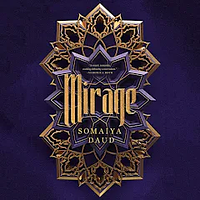Take a photo of a barcode or cover
A sci-fi romance based on Morrocan culture? I loved it!
I loved everything about this book, especially the world-building: a fantastical take on the Umayyad Caliphate, centering on Morocco and the Iberian Peninsula. I loved how language was twisted into the story, the slightly changed geographical names (or sometimes just left in tact), the way people's names had significant, and sometimes ironic, meaning (for the curious, look up what Amani means. Then look up what Maram means.) I cared about the characters, and particularly wanted to get to know more about Amani's family and her relationship to the different members. I loved the plot, the way things built up to each other in interesting ways...
And then suddenly, it just stopped.
I get that Mirage is meant to be part of a series, but it didn't feel like a natural stopping point. As much as I loved the book, I'm going to try to wait on reading any more until the entire series is published.
And then suddenly, it just stopped.
I get that Mirage is meant to be part of a series, but it didn't feel like a natural stopping point. As much as I loved the book, I'm going to try to wait on reading any more until the entire series is published.
My world is blown, this book is so fucking beautiful. The writing, the worldbuilding, the characters and the relationship, everything was breathtaking.
Couldn't put this book down at all, so excited to read the next book
Couldn't put this book down at all, so excited to read the next book
Mirage reminded me of Star Wars, and several of the characters and the same names as people I know, which made me distracted while reading. I'm not usually a sci-fi person, but this was okay. I probably won't finish the series, but I'm glad that I tried Mirage.
challenging
tense
medium-paced
Plot or Character Driven:
A mix
Strong character development:
Yes
Loveable characters:
Yes
Diverse cast of characters:
No
Flaws of characters a main focus:
No
This book is going to be on my top ten reads for the year list I just know it. Mirage is a wonderful addition to the YA SFF genre and Daud does a impeccable job blending her background and culture space odyssey. This story is a blend of antiquity of historical cultures and a stark dictatorship set in space with the encompassing technological advances..
Amani is kidnapped from her family and take to the heart of the Vathek empire. Her resemblance to the empire's heir forces her to become her double, and her life is the consequence of failure. Amani eventually realizes that there might be more to the cruel princess than there appears to be, and decides to join the rebellion to bring back their culture. Amani doesn't find agency she takes it and makes use of the horrible position she has been put in.
The writing in this book was poetic, and no plot point was extraneous or uneeded. Each setting was built excellently and the cultures were rich and beautiful. I loved how complex each of the characters were and that the characters seemed to understand empathy and forgiveness even for the most horrible characters.
I cannot wait for the next book! Thank you to the publisher for sending me an ARC.
Amani is kidnapped from her family and take to the heart of the Vathek empire. Her resemblance to the empire's heir forces her to become her double, and her life is the consequence of failure. Amani eventually realizes that there might be more to the cruel princess than there appears to be, and decides to join the rebellion to bring back their culture. Amani doesn't find agency she takes it and makes use of the horrible position she has been put in.
The writing in this book was poetic, and no plot point was extraneous or uneeded. Each setting was built excellently and the cultures were rich and beautiful. I loved how complex each of the characters were and that the characters seemed to understand empathy and forgiveness even for the most horrible characters.
I cannot wait for the next book! Thank you to the publisher for sending me an ARC.
emotional
hopeful
informative
reflective
sad
tense
slow-paced
Plot or Character Driven:
Character
Strong character development:
Yes
Loveable characters:
Yes
Diverse cast of characters:
Yes
Flaws of characters a main focus:
Yes
It is a slow burn political and psychologisch story that is told beautiful
I still love this book. The descriptions and the world are beautiful written. I would love to see this all come to life! It is a wonderful forbidden love story that leaves you hungry for the sequel. I cannot wait to find out what happens next! (Second read)
Admittedly, I had a hard time getting into this book. While the world building and the commentary on the importance of cultural identity were well done, the pacing and the imitative storyline fell short.
Mirage shines is its ability to portray a firsthand account of the experiences of the conquered and the processes of cultural genocide. Amani’s observations on the removal of language, the banning of religious practice and scripture, and the condemnation of unique cultural ceremonies are all indicative of an oppressing society attempting to culturally assimilate another. By highlighting these processes in a scifi setting, Mirage reintroduces them to and draws parallels with the current social discourse and our recent world history. However, this is only obvious in the first third of the novel.
All in all, the pacing of Mirage is very slow. The first half of the book is basically a period of re-education for the protagonist, so it’s a lot of sitting and listening to other characters call her useless. In the second half she becomes more active, so I had hoped that the pacing would pick up as she became more involved with the rebellion. It did not. It was more sitting and listening as people thought she was someone else.
As you read Mirage it becomes obvious that it is classically inspired. It follows a familiar plotline of the everyday hero finding love and discovering bravery and morality, and then attempting to lead by example and inspire goodness in their enemies. It is a good archetype. Unfortunately, Mirage leans a little too heavily into this so it becomes a bit derivative. It is my hope that as the series progresses it will find its own voice, because there are definitely a lot of good things about this book that I would like to see continue.
Mirage shines is its ability to portray a firsthand account of the experiences of the conquered and the processes of cultural genocide. Amani’s observations on the removal of language, the banning of religious practice and scripture, and the condemnation of unique cultural ceremonies are all indicative of an oppressing society attempting to culturally assimilate another. By highlighting these processes in a scifi setting, Mirage reintroduces them to and draws parallels with the current social discourse and our recent world history. However, this is only obvious in the first third of the novel.
All in all, the pacing of Mirage is very slow. The first half of the book is basically a period of re-education for the protagonist, so it’s a lot of sitting and listening to other characters call her useless. In the second half she becomes more active, so I had hoped that the pacing would pick up as she became more involved with the rebellion. It did not. It was more sitting and listening as people thought she was someone else.
As you read Mirage it becomes obvious that it is classically inspired. It follows a familiar plotline of the everyday hero finding love and discovering bravery and morality, and then attempting to lead by example and inspire goodness in their enemies. It is a good archetype. Unfortunately, Mirage leans a little too heavily into this so it becomes a bit derivative. It is my hope that as the series progresses it will find its own voice, because there are definitely a lot of good things about this book that I would like to see continue.
"You do not kneel or bend, I told myself. To anyone. You continue." Amani gets kidnapped from the Vathek to serve as a body double for the Princess who is hated by her own people. I loved this book as it offers the best character change to date, from master and slave, to sisters and companions. The only issues I had with this book? The lack of poetry.
Full review on Mirage available on: https://themaltesebookworm.wordpress.com/2019/01/09/mirage/
Full review on Mirage available on: https://themaltesebookworm.wordpress.com/2019/01/09/mirage/





